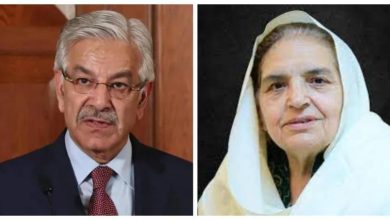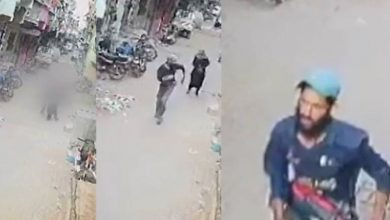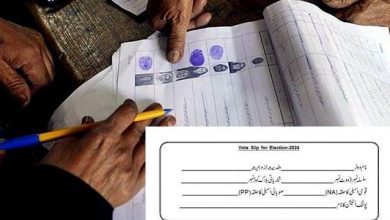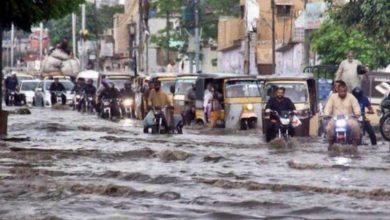Iranian President Raisi reaches Lahore
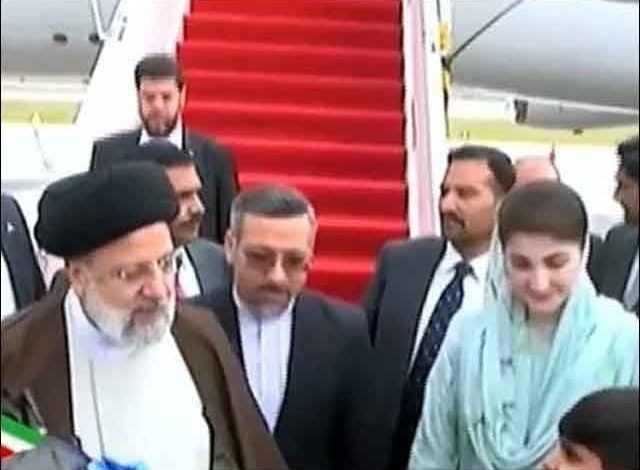
Iranian President Ebrahim Raisi reached Lahore on Tuesday on the second day of his official visit to Pakistan.
The Iranian president and his delegation was received at the airport by Punjab Chief Minister Maryam Nawaz. This is the first visit by a foreign head of state since the new government took power following the February 8 elections.
After reaching the provincial capital, the Iranian president visited Allama Iqbal’s mausoleum.
Pakistan and Iran agreed to strengthen bilateral economic and security cooperation by setting a $10 billion trade target and jointly fighting the menace of terrorism, as the Iranian president began his three-day tour of the country on Monday.
President Raisi was accorded a warm welcome upon arrival in Islamabad. He spent his first day of the visit in meetings with Prime Minister Shehbaz Sharif, President Asif Ali Zardari, and Army Chief Gen Asim Munir. The Senate chairman and the Nationals Assembly speaker also called on the visiting president.
During the formal talks at the Prime Minister’s House, the two sides discussed a wide range of issues covering bilateral ties as well as regional and international issues. Following their talks, the two leaders also spoke at a joint press conference.
Raisi travelled to Islamabad three months after the two countries were on the verge of a major conflict after Iran launched missile strikes inside the country in January. Pakistan retaliated with similar strikes two days later. However, the situation was quickly brought under control as Iran dispatched its top diplomat to Islamabad.
Since then the two countries have been making efforts to bury that bad patch in their bilateral ties. The fact the Iranian president travelled to Islamabad despite simmering tensions with Israel suggests the importance Tehran attaches to its ties with Pakistan, according to officials.
The warm reception being given to the Iranian president by Pakistan also indicated keenness on the part of Islamabad to get over January’s tit-for-tat missile strikes. At a joint news conference, the two leaders reaffirmed their commitments to expanding wide-ranging bilateral cooperation.
Both sides admitted that the current volume of the bilateral trade was not acceptable. They agreed to increase it to $10 billion from the current volume of around $2 billion. They vowed to expand the bilateral cooperation in areas of trade, energy, connectivity, and people-to-people contacts
Against the backdrop of the recent tensions, border security and the issue of terrorism were some of the major talking points. Shehbaz underlined that terrorism was a common threat and both sides needed to fight it collectively. Raisi hoped his visit would prove a “turning point” in the bilateral ties.
Both the leaders expressed deep concern at the situation in Gaza and called for international efforts for an immediate and unconditional ceasefire, lifting of the siege, and provision of humanitarian relief to the people of Gaza.
Prime Minister Shehbaz lauded the stance taken by Iran against Israel. He also appreciated the Iranian leadership on Iran’s unequivocal and principled support for the Kashmiri people and their legitimate rights.
In remarks, Raisi said that the killings by Israel in Gaza were being committed with the support of the United States and other Western countries. He criticized the international organizations, including the United Nations, saying: “They say they support human rights, but they proved that they are inefficient.”
The two sides also discussed the long-delayed Iran-Pakistan (IP) Gas Pipeline project. The multibillion-dollar gas project was supposed to be completed in December 2014. Pakistan, however, could not initiate the work on its side of the border, fearing US economic sanctions.
Recently, nevertheless, authorities in Pakistan decided to start the work on the project. In the first phase, Pakistan would build a pipeline from Gwadar to the Iranian border. The US had voiced its concerns and warned that the Pakistani move could trigger potential economic sanctions.
Officials said that Iran was aware of Pakistan’s compulsions and during their talks; the two leaders discussed the possible alternative options to avoid US sanctions. They added that Iran was ready to help Pakistan find ways and means to complete the project.
The two leaders also signed eight cooperation agreements, according to the Prime Minister’s Office.

